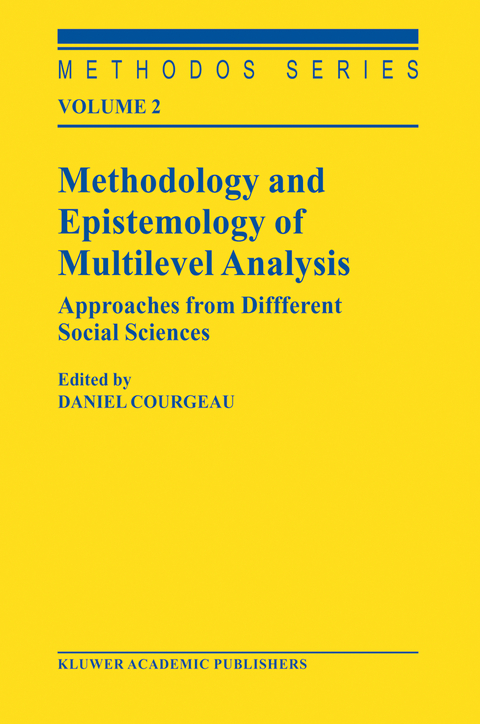
Methodology and Epistemology of Multilevel Analysis
Springer (Verlag)
978-90-481-6365-6 (ISBN)
General Introduction.- 1. Opposition between holism and individualism.- 2. How are the two approaches linked?.- 3. A plurality of aggregation levels and a plurality of time scales.- 4. Towards a recomposition and a multilevel synthesis.- 5. Outline of this volume.- 1 Multilevel modelling of educational data.- 1. Fundamentals: units and levels.- 2. The basic multilevel model.- 3. Cross-classified models.- 4. The multiple membership model.- 5. Types of response.- 6. Final thoughts about new insights.- 2 From the macro-micro opposition to multilevel analysis in demography.- 1. Introduction.- 2. The aggregate period approach.- 3. Cohort analysis.- 4. Event history analysis.- 5. Contextual and multilevel analysis.- 6. Conclusion.- 3 Potentialities and limitations of multilevel analysis in public health and epidemiology.- 1. Introduction.- 2. The presence of multiple levels: conceptual and methodological implications.- 3. Multilevel analysis.- 4. Multilevel analysis in public health and epidemiology.- 5. Challenges raised by the use of multilevel analysis in epidemiology.- 6. Limitations and complementary approaches.- 4 Exploring small area population structures with census data.- 1. Introduction.- 2. The concept of multilevel models for geographically based data.- 3. Census data availability.- 4. Some previous examples of multilevel modelling with census data.- 5. Estimating and explaining population structures with census data.- 6. Investigating small area variations using SAR with recently added area classifications.- 7. Further topics.- 8. Conclusion.- 5 Organisational levels and time scales in economics.- 1. Introduction.- 2. Frozen time.- 3. Spread out time.- 4. Sequential time.- 5. Adaptive time.- 6. Individualism versus holism.- 7. Economic epistemological positions.-8. Micro and macro-analysis.- 9. From theoretical to empirical analysis.- 6 Causal analysis, systems analysis, and multilevel analysis: Philosophy and epistemology.- 1. Introduction. Object of this chapter.- 2. The causal principle.- 3. Multicausal models.- 4. The Stoic Principle of causality.- 5. Non-causal determinations.- 6. The notion of reciprocal action.- 7. The nature of levels.- 8. Factors and systems.- 9. A social philosophy.- 10. Conclusion. Causal analysis, systems analysis, and multilevel analysis.- General Conclusion.- 1. Experimental versus non-experimental approach.- 2, Probability: Objectivist, subjectivist and logicist approach.- 3. A better definition of levels and a better interconnection between them.- 4. Towards a fuller theory.- Author index.
| Erscheint lt. Verlag | 9.12.2010 |
|---|---|
| Reihe/Serie | Methodos Series ; 2 |
| Zusatzinfo | XII, 238 p. |
| Verlagsort | Dordrecht |
| Sprache | englisch |
| Maße | 155 x 235 mm |
| Themenwelt | Geschichte ► Teilgebiete der Geschichte ► Wirtschaftsgeschichte |
| Geisteswissenschaften ► Philosophie ► Allgemeines / Lexika | |
| Geisteswissenschaften ► Philosophie ► Erkenntnistheorie / Wissenschaftstheorie | |
| Studium ► Querschnittsbereiche ► Epidemiologie / Med. Biometrie | |
| Wirtschaft ► Allgemeines / Lexika | |
| Wirtschaft ► Volkswirtschaftslehre | |
| ISBN-10 | 90-481-6365-X / 904816365X |
| ISBN-13 | 978-90-481-6365-6 / 9789048163656 |
| Zustand | Neuware |
| Haben Sie eine Frage zum Produkt? |
aus dem Bereich


